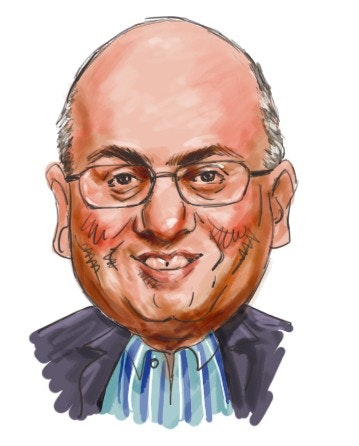Last year was a tough year for many hedge funds. Between political uncertainty, concerns over the Eurozone financial crisis and issues surrounding the US debt ceiling, the average fund lost roughly 4 percent compared to gains in the S&P 500 of around 2 percent after adjusting for dividends. However, there were a handful of funds that didn’t come up all lemons – a handful that beat the odds and came out on top. Numbered amongst these was SAC Capital Advisors.

Steve Cohen founded his SAC Capital Advisors in 1992. The fund, which uses both fundamental and quantitative analysis, has enjoyed enormous success, returning nearly 30% during the last 20 years. In 2011, the fund was up 8% through the end of November. How did he do it?
Cohen’s strategy is to exploit market inefficiencies – even small ones –because of this, his fund trades in volume and maintains a broader scope than many of its contemporaries. Cohen also employs several fund managers who are chasing different strategies. As a result of this SAC Capital may have thousands of stocks in its portfolio at any moment. According to the 13F filed on February 14, SAC Capital had over 2,100 positions at the end of the fourth quarter, valued at $15.78 billion. Then, in January, Cohen bought huge chunks of American Eagle Outfitters (AEO) and Peets Coffee & Tea (PEET) – buying stakes worth 4.9% and 5.7% of the respective companies.
American Eagle Outfitters
American Eagle Outfitters is a clothing retailer that targets men and women age 15-25. It also offers a line for children. The company recently traded at $14.17 a share, which is near the upper end of its 52-week range ($10.00 to $16.37). Analysts give the company a mean one-year target estimate of $15.58. On January 30, when Cohen purchased his stake in American Eagle, the share price ranged from $13.75 to $14.09, so Cohen already made some money on his investment. Even now, with the upside, American Eagle is priced at just 13.37 times its future earnings and 1.99 times its book value. The company also offers a high 44 cents dividend (3.00% yield). Analysts expect the company’s earnings to increase by 10.52% a year on average over the next five years, versus expectations of 14.02% for its industry.
Looking at the company in greater detail, we can see that its operating margins are worse than its historical averages. Specifically, its TTM gross margin is worse than its five-year average (37.4% vs. 42.9%), its TTM operating margin is worse than its five-year average (9.5% vs. 15.1%) and its TTM net margin is worse than its five-year average (6.2% vs. 8.7%). What’s more, these margins have been consistently declining. When that happens, it typically means that the company is losing out to its competitors and is likely cutting prices in response.
American Eagle could bounce back but it will take some work. In the mean time, investors can enjoy the dividend and generate a modest return on the upside if analyst recommendations are correct. For our money, we like healthy margins. Right now, we find that American Eagle is best suited for a shorter term play – if analysts are right about its target price, the company will return roughly 9.95% from its current price plus another 3.00% from its dividend – or a long-term speculative play, in which investors bet that the company will be able to improve its margins.
Peets Coffee & Tea
Steve Cohen was also bullish about Peets Coffee & Tea in January. He bought 740,074 shares in the company, a position that represents a 5.7% stake in Peets Coffee, on January 23. Peets Coffee is a specialty coffee roaster. It sells a variety of coffee, teas and related products through its own stores as well as selected grocers. The company is mostly regional. Its business is focused on the West Coast but it also has locations in Illinois and Massachusetts.
Peets Coffee recently traded at $66.52, up from the $57.79 to $58.32 it went for on the day Cohen bought in, so he already made a good profit on the investment. The company is trading near the top of its 52-week range ($41.02 to $69.97). Analysts give the company a mean one-year target estimate of $68.00. If they are right, Peets Coffee won’t go too much higher. Given that it is currently priced at 29.83 times its earnings and almost 5 times its book value, this could easily happen. However, Peets Coffee does have a strong earnings growth estimate. Its earnings are expected to grow an average of 20.33% a year over the next five years, versus expectations of 13.40% for its industry.
Looking at the operating margins for Peets Coffee, things were going along swimmingly. Its gross margin averaged 53.26% from 2006 to 2010 (range 52.50% to 54.10%) while its operating margin (range 8.90% to 13.00%) increased every year and its net margin (range 3.40% to $5.20) moved consistently upward. But, that was then. In the latest quarter the numbers are very different. Peets Coffee had a gross margin of 48.40% whereas it has not been lower than 52.40% in the last 10 years at least. Its operating margin is also low, coming in at 6.70%; it had not dipped below 7.80% in the last 10 years. The company’s net margin came in low as well. At just 1.70%, it hadn’t dropped that low since hitting 1.20% in 2001.
Peets Coffee’s margins seem really low compared to the magnitude of its forward P/E and P/B ratio. While its earnings growth estimate is enticing, we just don’t think there is enough upside to make investing in the stock worth it at its current price.




